What Kind Of Money Is A Gold Certificate Considered To Be
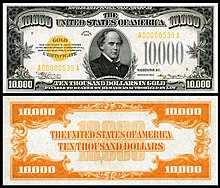
A gold certificate in general is a document of ownership that gold owners hold instead of storing the actual gold. It has both a historic significant every bit a U.S. newspaper currency (1863–1933) and a current pregnant as a fashion to invest in gold.
Banks may event gold certificates for gold that is allocated (non-fungible) or unallocated (fungible or pooled). Unallocated golden certificates are a course of partial-reserve banking and do not guarantee an equal exchange for metallic in the event of a run on the issuing bank'south aureate on eolith.[1] Allocated gold certificates should be correlated with specific numbered bars, although it is difficult to make up one's mind whether a bank is improperly allocating a single bar to more than one party.[2]
Usage in the United States [edit]
The gold certificate was used from 1863 to 1933 in the United States equally a course of paper currency. Each document gave its holder championship to a corresponding amount of gold coin at the statutory rate of $20.67 per troy ounce established by the Coinage Act of 1834. Therefore, this type of paper currency was intended to correspond bodily gold coinage.
The early on history of Us gilt certificates is somewhat hazy. They were authorized nether the Act of March three, 1863, just dissimilar the United States Notes also authorized, they plainly were non printed until 1865. They did non take a series date, and were manus-dated upon issue. "Issue" meant that the government took in the equivalent value in gold, and the first several series of gold certificates promised to pay the corporeality only to the depositor, who was explicitly identified on the certificate itself. The first issue featured a vignette of an eagle uniformly across all denominations. Several later bug (series 1870, 1871, and 1875) featured various portraits of historical figures. The contrary sides were either blank or featured abstract designs. The only exception was the $xx of 1865, which had a movie of a $twenty aureate coin.
From 1862 to 1879, Us Notes were legal tender and the dominant paper currency but were not convertible at face value into gold and traded at a discount. Withal some transactions, such as community duties and interest on the federal debt, were required to exist made in gold. Thus the early gold certificates were acceptable in some transactions where United States Notes were not, but were non used in general circulation due to their premium value. After 1879, the authorities was willing to redeem U.s. Notes at confront value in gold, bringing the United States Notes into parity with gold certificates, making the latter also a candidate for full general circulation.
The Series of 1882 was the first serial that was payable to the bearer; it was transferable and anyone could redeem it for the equivalent in golden. This was the case with all gold certificate series from that point on, with the exception of 1888, 1900, and 1934. The series of 1888 and 1900 were issued to specific depositors, as before. The serial of 1882 had the same portraits every bit the series of 1875, only a unlike dorsum design, featuring a series of eagles, likewise as complex border work.
Historic U.S. golden certificates (1863–1933) [edit]
Gilt certificates, along with all other U.S. currency, were made in two sizes—a larger size from 1865 to 1928, and a smaller size beginning with the series of 1928. The backs of all large-sized notes (and likewise the minor-sized notes of the Series of 1934) were orange, resulting in the nickname "yellow boys" or "goldbacks". The backs of the Series of 1928 bills were dark-green, and identical to the corresponding denomination of the more familiar Federal Reserve Notes, including the usual buildings on the $ten through $100 designs and the less-known abstract designs of denominations $500 and upwardly. Both large and small size aureate certificates characteristic a gold treasury seal on the obverse, just as U.S. Notes feature a red seal, silver certificates (except World War Ii Hawaii and North Africa notes) a blueish seal, and Federal Reserve Notes a green seal.
In the case of the Series 1928 (small-size) golden certificates, they bore a redemption statement with the following text: "This certifies that at that place have been deposited in the Treasury of the United States of America XXXXX Dollars in Golden Coin payable to the bearer on demand."
Series of 1900 $10,000 Golden Certificates [edit]
Another interesting note is the Series of 1900. Along with the $5,000 and $10,000 of the Series of 1888, all 1900 bills ($10,000 denomination only) have been redeemed, and no longer take legal tender status. Almost were destroyed, with the exception of a number of 1900 $10,000 bills that were in a box in a post role near the U.S. Treasury in Washington, D.C. There was a burn on thirteen December 1935, and employees threw burning boxes out into the street. The box of canceled high-denomination currency burst open. Much to everyone'south dismay, they were worthless. There are several hundred outstanding, and their buying is technically illegal, as they are stolen property. However, due to their lack of intrinsic value, the government has not prosecuted any owners, citing more of import concerns. They acquit a collector value in the numismatic market and, as noted in Bowers and Sundermans' The 100 Greatest American Currency Notes, the only United States notes that can be purchased for less than their face value. This is the only example of "circulating" U.Southward. currency that is not an obligation of the authorities, and thus not redeemable past a Federal Reserve Depository financial institution. The note bears the portrait of Andrew Jackson and has no printed pattern on its reverse side.
End of the Gilded Certificate Era in the United States (March 1933) [edit]
As part of the Roosevelt Assistants's response to the effects of the Corking Low and particularly the outflow of gilded for hoarding and for shipment overseas, the practise of redeeming gold certificates for gold coin was ended by Presidential Annunciation 2039 (dated half dozen March 1933) and Executive Order 6073 (dated ten March 1933). On five April 1933, Executive Order 6102 was issued; it required all persons in the Usa to evangelize (with limited exceptions) all gold coin, gold bullion, and golden certificates to the Federal Reserve by 1 May 1933. By club of the Secretary of the Treasury dated 28 December 1933, individual possession of gold certificates was declared illegal.[3] Due to their (then-)illegal status and public fear that the notes would be devalued and fabricated obsolete, this resulted in the majority of circulating notes being retired.
The restrictions on individual ownership of gold certificates were revoked past Treasury Secretarial assistant Douglas Dillon effective 24 April 1964, primarily to allow collectors to own examples legally; withal, gold certificates are no longer redeemable for aureate, merely instead tin can exist exchanged at face value for other U.S. coin and currency designated as legal tender (e.g., Federal Reserve Notes and United States Notes).[4] In general, the notes are scarce and valuable, especially examples in "new" status.
Series of 1934 Gilded Certificates; Mod usage by the Federal Reserve Organization [edit]
The Aureate Reserve Act of 1934 established a new accounting mechanism, through the event of a special series of gold certificates, to business relationship for gilded held by the Federal Reserve Banks on behalf of the United states of america. The Secretarial assistant of the Treasury is authorized to "prescribe the grade and denominations of the certificates".[5]
The Series of 1934 (bearing the signatures of William Alexander Julian (Treasurer) and Henry Morgenthau (Treasury Secretary)) consisted of the following denominations: $100; $1,000; and $10,000 (mirroring the circulating Federal Reserve Notes of the same series and denominations). However, there was also a $100,000 denomination (begetting the portrait of President Woodrow Wilson) that had no equivalent in other types of U.S. currency and was as well the largest denomination banknote ever issued past the U.s.a. Treasury. 42,000 banknotes of the $100,000 denomination were printed. According to the Agency of Engraving and Printing'due south own website, the $100,000 banknotes were printed between 18 December 1934 and 9 January 1935.[six] These notes were never intended for apportionment in the general economy and there are no known instances of whatever such certificates ever existence released outside government channels, fifty-fifty as specimens. Reflecting the purpose for which these certificates were issued, the redemption statement on the confront of the banknotes was changed to read as follows: "This certifies that in that location is on eolith in the Treasury of the Us of America XXXXX Dollars in Gold payable to bearer on demand as authorized by constabulary."
Since the 1960s, most of the paper certificates have been destroyed,[7] and the currently prescribed class of the "certificates" issued to the Federal Reserve is an electronic book entry account between the Federal Reserve and the Treasury.[viii] The electronic book entry system also allows for the various regional Federal Reserve Banks to commutation document balances amid themselves.[9] Even so, the Treasury authorized a minor amount of the banknotes to be retained at certain Federal Reserve Banks (where they had been used) for educational and historical purposes, such equally being placed on public brandish. In addition, a $100,000 Series of 1934 aureate certificate is office of the numismatic collection at the Smithsonian's National Museum of American History.[10]
As of Dec 2013 the Federal Reserve reported[eleven] belongings $11.037 billion (face value) of these certificates. The Treasury backs these certificates by holding an equivalent amount of gold at the statutory exchange rate of $42 2/9 per troy ounce of gold, though the Federal Reserve does non take the right to commutation the certificates for gold. As the certificates are denominated in dollars rather than in a set weight of gilt, any change in the statutory exchange rate towards the (much college) market charge per unit would result in a windfall bookkeeping gain for the Treasury.
Series and varieties [edit]
| Series | Value | Features/varieties |
|---|---|---|
| 1865 [nb 1] |
| Notes from this first issue are extremely rare in lower ($20 and $100) denominations. A unmarried $1,000 and $5,000 are reported to exist in a regime collection, and an issued $500 or $ten,000 has never been seen.[14] In add-on to the two engraved signatures customary on United States banknotes (the Register of the Treasury and Treasurer of the United States), the before issues of Gold certificates (i.eastward., 1865, 1870, 1875, and some 1882) included a third signature of one of the Assistant Treasurers of the U.s. (in New York or Washington, D.C.).[xv] Known as a countersigned or triple-signature note, this characteristic existed for all Serial prior to 1882 (and the showtime printing of the Series 1882). |
| 1870–75 |
| Series 1870 notes introduced portraits to gilded certificates. Both Series of 1870 and Serial of 1875 are countersigned notes. Between the ii series, the $100 is extremely rare, the $500, $ane,000, and $x,000 are unique (in authorities collections), and the $5,000 is unknown.[14] |
| 1882 |
| The Human action of 12 July 1882 authorized denominations "not less than $twenty".[16] |
| 1888 |
| Series 1888 notes were intended for banking company utilise to rest accounts without having to transport big volumes of golden bullion or currency.[17] They take all been redeemed.[18] |
| 1900 | $10,000 | Canceled -- Not legal tender. Several hundred notes exist and examples occasionally appear for sale. See above. |
| 1905 | $20 | |
| 1906 | $20 | |
| 1907 |
| |
| 1913 | $50 | |
| 1922 |
|
Complete Usa gilded certificate type set [edit]
Large [edit]
| Value | Issue | Series | Fr. | Prototype | Portrait | Signature & seal varieties |
|---|---|---|---|---|---|---|
| twenty$20 | 1st | 1865 | Fr.1166b | Prototype pending | Vignettes of eagle with shield | 1166b – Colby and Spinner – small red |
| 100$100 | 1st | 1865 | Fr.1166c |  | Vignette of hawkeye with shield | 1166c – Colby and Spinner – small cherry |
| 500$500 | 1st | 1865 | Fr.1166d proof |  | Vignette of hawkeye with shield | 1166d – Colby and Spinner – small red |
| 1000$one,000 | 1st | 1865 | Fr.1166e proof | 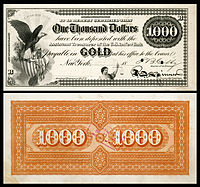 | Vignettes of eagle with shield, and justice with scales. | 1166e – Colby and Spinner – modest red |
| 5000$5,000 | 1st | 1865 | Fr.1166f proof |  | Vignettes of hawkeye with shield and female | 1166f – Colby and Spinner – small red |
| 10000$10,000 | 1st | 1865 | Fr.1166g proof |  | Vignettes of eagle with shield | 1166g – Colby and Spinner – pocket-size reddish |
| 100$100 | 2nd & 3rd | 1870–75 | Fr.1166h | 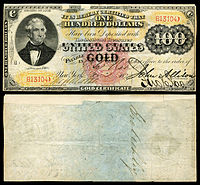 | Thomas Hart Benton | 1166h – thirty and thirty – big red (1870) 1166m – Allison and New – large red (1875) |
| 500$500 | 2nd & 3rd | 1870–75 | Fr.1166i |  | Abraham Lincoln | 1166i – Allison and Tuttle – large carmine (1870) 1166n – Allison and New – big red (1875) |
| thou$1,000 | 2nd & 3rd | 1870–75 | Fr.1166j proof |  | Alexander Hamilton | 1166j – xxx and xxx – large ruddy (1870) 1166o – Allison and New – large red (1875) |
| 5000$5,000 | 2nd & 3rd | 1870–75 | Fr.1166k proof |  | James Madison | 1166k – Allison and Gilfillan – big red |
| 10000$10,000 | 2d & 3rd | 1870–75 | Fr.1166l proof |  | Andrew Jackson | 1166l – xxx and xxx – large red (1870) 1166q – Allison and Wyman – large red (1875) |
| ten$10 | 7th | 1907 | Fr.1172 |  | Michael Hillegas | 1167 – 1172 1167 – Vernon and Treat – Gold 1172 – Teehee and Burke – Gilt |
| 10$10 | 9th | 1922 | Fr.1173 |  | Michael Hillegas | 1173 – Speelman and White – Aureate 1173a – Speelman and White – Gold, minor serial numbers |
| xx$20 | 4th | 1882 | Fr.1175a |  | James Garfield | 1174 – 1178 1174 – Bruce and Gilfillan – dark-brown 1178 – Lyons and Roberts – modest red |
| 20$20 | 4th | 1882 | Fr.1177 |  | James Garfield | |
| twenty$xx | 7th | 1905 | Fr.1180 |  | George Washington | 1179 – Lyons and Roberts – small-scale red 1180 – Lyons and Treat – small cherry-red |
| 20$twenty | 7th | 1906 | Fr.1185 |  | George Washington | 1181 – 1186 1181 – Vernon and Treat – Gilt 1186 – Teehee and Burke – Gilt |
| 20$20 | ninth | 1922 | Fr.1187 | 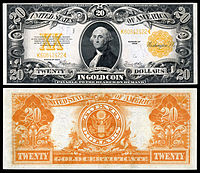 | George Washington | 1187 – Speelman and White – Gilded |
| 50$50 | 4th | 1882 | Fr.1189a |  | Silas Wright | 1188 – 1197 1188 – Bruce and Gilfillan – brown 1197 – Napier and McClung – small-scale carmine |
| 50$50 | 4th | 1882 | Fr.1195 |  | Silas Wright | |
| 50$50 | 9th | 1913 | Fr.1199 |  | Ulysses S. Grant | 1198 – Parker and Shush – Gold 1199 – Teehee and Burke – Gilt |
| fifty$fifty | 9th | 1922 | Fr.1200a |  | Ulysses S. Grant | 1200 – Speelman and White – Gilded 1200a – Speelman and White – Gold, minor serial numbers |
| 100$100 | fourth | 1882 | Fr.1202 |  | Thomas Hart Benton | 1201 – 1214 1201 – Bruce and Gilfillan – brown 1214 – Teehee and Shush – pocket-size red |
| 100$100 | 4th | 1882 | Fr.1207 |  | Thomas Hart Benton | |
| 100$100 | 9th | 1922 | Fr.1215 |  | Thomas Hart Benton | 1215 – Speelman and White – small scarlet |
| 500$500 | fourth | 1882 | Fr.1216a |  | Abraham Lincoln | 1215a – 1216b 1215a – Bruce and Gilfillan – brown 1216b – Teehee and Shush – minor carmine |
| 500$500 | ninth | 1922 | Fr.1217 |  | Abraham Lincoln | 1217 – Speelman and White – pocket-size reddish |
| 1000$1,000 | 4th | 1882 | Fr.1218a |  | Alexander Hamilton | 1218 – 1218g 1218 – Bruce and Gilfillan –brown 1218g – Lyons and Care for – small red |
| grand$1,000 | 4th | 1882 | Fr.1218g |  | Alexander Hamilton | |
| 1000$ane,000 | 8th | 1907 | Fr.1219 |  | Alexander Hamilton | 1219 – 1219e 1219 – Vernon and Care for – Gold 1219e – Teehee and Burke – Aureate |
| k$ane,000 | 9th | 1922 | Fr.1220 |  | Alexander Hamilton | 1220 – Speelman and White – Gold |
| 5000$5,000 | 4th | 1882 | Fr.1221a proof |  | James Madison | 1221 – 1221j 1221 – Bruce and Gilfillan – brown 1221j – Teehee and Burke – pocket-sized ruby-red |
| 5000$5,000 | 5th | 1888 | Fr.1222a proof |  | James Madison | 1222 – Rosecrans and Hyatt – large red 1222a – Rosecrans and Nebecker – small-scale blood-red |
| 10000$ten,000 | 4th | 1882 | Fr.1223a proof |  | Andrew Jackson | 1223 – 1223g 1223 – Bruce and Gilfillan – brown 1223g – Teehee and Burke – small-scale red |
| 10000$10,000 | 5th | 1888 | Fr.1224a proof |  | Andrew Jackson | 1224 – Rosecrans and Hyatt – large red 1224a – Rosecrans and Nebecker – small ruddy |
| 10000$10,000 | sixth | 1900[nb 2] | Fr.1225 |  | Andrew Jackson | 1225a – 1225h 1225a – Lyons and Roberts – small red 1225h – Teehee and Shush – small reddish |
Modest [edit]
| Value | Series | Fr. | Image | Portrait | Signature & seal varieties |
|---|---|---|---|---|---|
| ten$10 | 19281928 | Fr.2400 |  | Alexander Hamilton | 2400 – Woods and Mellon – gold 2401 – Woods and Mellon (1928A) – gold. |
| 20$20 | 19281928 | Fr.2402 | 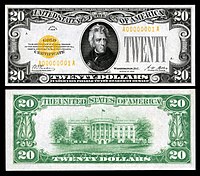 | Andrew Jackson | 2402 – Wood and Mellon – golden 2403 – Woods and Mills (1928A) – aureate. |
| 50$fifty | 19281928 | Fr.2404 |  | Ulysses Grant | 2404 – Woods and Mellon – gilded |
| 100$100 | 19281928 | Fr.2405 |  | Benjamin Franklin | 2405 – Woods and Mellon – gilt. |
| 500$500 | 19281928 | Fr.2407 |  | William McKinley | 2407 – Forest and Mellon – gold. |
| 1000$1,000 | 19281928 | Fr.2408 |  | Grover Cleveland | 2408 – Woods and Mellon – gold. |
| 5000$5,000 | 19281928 | Fr.2410 |  | James Madison | 2410 – Wood and Mellon – gold. |
| 10000$ten,000 | 19281928 | Fr.2411 |  | Salmon P. Hunt | 2411 – Woods and Mellon – gold. |
| 100$100 | 19341934 | Fr.2406 |  | Benjamin Franklin | 2406 – Julian and Morgenthau – gilt. |
| 1000$1,000 | 19341934 | Fr.2409 | 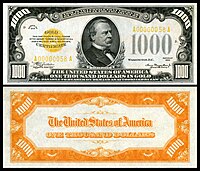 | Grover Cleveland | 2409 – Julian and Morgenthau – golden. |
| 10000$10,000 | 19341934 | Fr.2412 |  | Salmon P. Chase | 2412 – Julian and Morgenthau – gilded. |
| 100000$100,000 | 19341934 | Fr.2413 |  | Woodrow Wilson | 2413 – Julian and Morgenthau – gilded. |
Series catalogue [edit]
This is a chart of some of the series of gilded certificates printed. Each entry includes: series yr, general description, and printing figures if bachelor.
Small-size gold certificates [edit]
| Series | Denominations | Signatures | Printing Figure |
|---|---|---|---|
| 1928 | $10 | W. O. Woods – Andrew Westward. Mellon | 33,356,000 |
| 1928 | $20 | W. O. Forest – Andrew Westward. Mellon | 67,704,000 |
| 1928 | $fifty | W. O. Wood – Andrew Westward. Mellon | 5,520,000 |
| 1928 | $100 | W. O. Woods – Andrew Westward. Mellon | 3,240,000 |
| 1928A | $100 | Westward. O. Woods – Ogden L. Mills | 120,000* |
| 1934 | $100 | Westward. A. Julian – Henry Morgenthau, Jr. | 120,000* |
| 1928 | $500 | Due west. O. Woods – Andrew W. Mellon | 420,000 |
| 1928 | $1,000 | W. O. Wood – Andrew W. Mellon | 288,000 |
| 1934 | $1,000 | W. A. Julian – Henry Morgenthau, Jr. | 84,000* |
| 1928 | $5,000 | West. O. Woods – Andrew W. Mellon | 24,000 |
| 1928 | $10,000 | West. O. Wood – Andrew W. Mellon | 48,000 |
| 1934 | $10,000 | Westward. A. Julian – Henry Morgenthau, Jr. | 36,000* |
| 1934 | $100,000 | W. A. Julian – Henry Morgenthau, Jr. | 42,000* |
* Notes: All Series 1928A gold certificates were consigned to destruction and never released; none[20] are known to exist.
See also [edit]
- Silver document (U.s.a.)
- National gold bank note
- Digital gold currency
Footnotes [edit]
- ^ Notes issued under a given Series (e.yard., Serial 1882, Series 1907) are, in some cases, released over a menses of years, every bit reflected in the Friedberg number signature and seal varieties. For example, based on dates of the signature combinations,[thirteen] the Series 1907 $x gold certificate was commencement issued with the signature combination of Vernon and Treat (in office together from 1906 to 1909) and last issued with the Teehee and Burke signatures (in role together from 1915 to 1919). Therefore, a Series 1907 note could have been issued equally late every bit 1919.
- ^ There was a massive fire in a new Post Part building at the corner of 12th and Pennsylvania, in Washington D.C., on Friday, Dec 13, 1935. At the fourth dimension, part of the 6th floor was existence used for Treasury Department storage. Fire Fighters threw many boxes of documents out of the windows and into the streets below. One such box contained almost every surviving piece of the series 1900 Gold Certificates. Passersby rapidly grabbed them upwardly off the street, although all of the notes had been previously redeemed and canceled. Treasury records indicate that at that place are no outstanding redeemable notes of this series.[19]
Notes [edit]
- ^ "Gold Certificate". BullionVault. Archived from the original on Dec 2, 2011. Retrieved July 19, 2010.
- ^ "Interview: Harvey Organ, Lenny Organ, Adrian Douglas". King World News. vii Apr 2010. Archived from the original on 1 July 2010.
- ^ Morgenthau, Henry (Jr.) (Dec 28, 1933). "Secretarial assistant of the Treasury Gold Guild, December 28, 1933". FRASER (https://fraser.stlouisfed.org). Federal Reserve Banking company of St. Louis. Retrieved March 14, 2022.
- ^ Dillon, Douglas (April 24, 1964). "29 FR 5556, "Removal of Delivery Requirements for Gold Certificates and General License to Hold Gold Certificates"" (PDF). GovInfo.gov (https://world wide web.govinfo.gov). Function of the Federal Register. Retrieved March 14, 2022.
- ^ "Affiliate 31, Usa Code". Retrieved March 31, 2013.
- ^ "Denominations Above The $100 Notation". Bureau of Engraving and Printing. Retrieved March 16, 2022.
- ^ "CUSTODY OF Gilded CERTIFICATES, Series OF 1934, equally specified by the United States Treasury". Retrieved February 22, 2014.
- ^ "ISSUE AND REDEMPTION OF Gold CERTIFICATES, as specified by the Usa Treasury". Retrieved February 21, 2014.
- ^ "GOLD Document ACCOUNT, as Specified by Federal Reserve System". Retrieved February 21, 2014.
- ^ "100,000 Dollars, Gilt Certificate, Usa, 1934". National Museum of American History. Retrieved March sixteen, 2022.
- ^ "Federal Reserve H.iv.1 Release". Retrieved December 28, 2013.
- ^ Friedberg & Friedberg, pp. 164–173.
- ^ Friedberg & Friedberg, p. 303.
- ^ a b Friedberg & Friedberg, 2013, p. 165.
- ^ Blake, p. 19.
- ^ Waldron, George B. (1896). A Handbook on Currency and Wealth: With Numerous Table and Diagrams. Funk & Wagnallis Company. p. twenty. Retrieved July 6, 2014.
- ^ The Bankers' Mag. 43: 813. 1888.
- ^ Friedberg & Friedberg, 2013, pp. 172-173.
- ^ Friedberg & Friedberg, 2013, p. 173.
- ^ "USPaperMoney.Info". Retrieved December nine, 2011.
References [edit]
- Friedberg, Arthur 50.; Friedberg, Ira S. (2013). Paper Coin of the United States: A Complete Illustrated Guide With Valuations (20th ed.). Money & Currency Institute. ISBN978-0-87184-520-vii . Retrieved February xiv, 2014.
Source: https://en.wikipedia.org/wiki/Gold_Certificate_(United_States)#:~:text=A%20gold%20certificate%20in%20general,way%20to%20invest%20in%20gold.
Posted by: thomaswiltoped.blogspot.com

0 Response to "What Kind Of Money Is A Gold Certificate Considered To Be"
Post a Comment